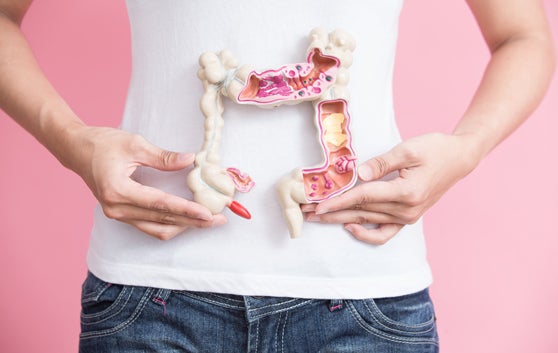How does IBS affect your body?
Doctors believe that irritable bowel syndrome (IBS) could be a problem with how your brain and gut work together, which is known as the brain–gut axis.3 In IBS, there is a problem with the way the bowels, also called the gut, work that is not related to their structure; the gut does not function normally.1 More specifically, IBS is a long-term or recurrent disorder usually involving disturbances of intestinal motor function and sensation.2
How does IBS influence the brain-gut axis?
The brain–gut axis affects three main functions in your body: 3,4
- Your thoughts, feelings, and emotions
- The speed at which food moves through your gut
- How readily you sense pain in the gut, even if you have a normal amount of gas or stool
In IBS, the nerve endings in the bowel wall, which control muscle function and affect sensations in the gut, are unusually sensitive. This means that normal conditions that can stimulate the bowel, such as eating a meal, having one’s menstrual period, or feeling pressure at work, may lead to a more significant response for persons with IBS. For these individuals, the nerves and muscles of the bowel are more active than normal, which can cause symptoms, such as diarrhea, bloating, or pain and discomfort.2
What other factors affect IBS?

In addition to the brain–gut axis, several other factors have been identified as potentially causing IBS symptoms: 1
- Certain mental health issues
- Stressful or difficult life events, such as divorce or separation, or physical or sexual abuse
- Bacterial infections in your digestive tract or changes in the type of bacteria in your gut
What are common IBS symptoms?

The most common symptoms of IBS are pain or discomfort in your abdomen and changes in your bowel movements.4 You may find that your stomach pain is worse after eating but improves after a bowel movement,5 although in some people, this makes the pain worse. If you have watery bowel movements (diarrhea), you might feel the need to go to the toilet suddenly. If you are constipated, you may have to strain when having a bowel movement, or you might feel like you cannot empty your bowels completely. You could also have a mixture of diarrhea and constipation.5
IBS is a chronic condition, meaning that it lasts a long time; it is normal for any of the following symptoms to come and go during this period:
- Stomach cramps—These are often worse after eating and better after a bowel movement.
- Bloating—You feel uncomfortably full, as if your stomach is swollen.
- A feeling you have not finished a bowel movement or not being able to control when you have a bowel movement (incontinence)
- Whitish mucus in your stool
- Excessive gas (flatulence)
- Back pain
- Feeling tired and lacking energy
- Feeling sick (nausea)
It is recommended that you see a doctor urgently if you ever experience the following:5
- Loss of weight for no reason
- Bleeding from your anus or blood in your stool
- A hard lump or swelling in your belly
- Shortness of breath, noticeable heartbeats (palpitations), and pale skin
These could be signs of something more serious.
| Talking to your doctor is the first step towards relief for your symptoms and a care plan that is right for you. Make an appointment with your doctor today to find out if you have IBS and what options are available to you. |
Read on to learn more about when you should talk to your doctor about symptoms and how to get diagnosed.
References
1. International Foundation for Gastrointestinal Disorders, FAQ About IBS. Available at: https://www.aboutibs.org/what-is-ibs-sidenav/faq-about-ibs.html. Accessed 25 September 2020
2. International Foundation for Gastrointestinal Disorders, Introduction to IBS. Available at: https://www.aboutibs.org/what-is-ibs-sidenav/intro-to-ibs.html. Accessed 25 September 2020
3. Camilleri M and Di Lorenzo C. The Brain-Gut Axis: From Basic Understanding to Treatment of Irritable Bowel Syndrome and Related Disorders. J Pediatr Gastroenterol Nutr. 2012;54(4):446–453. doi:10.1097/MPG.0b013e31823d34c3.
4. National Institute of Diabetes and Digestive and Kidney Diseases, Symptoms & Causes of Irritable Bowel Syndrome. Available at: https://www.niddk.nih.gov/health-information/digestive-diseases/irritable-bowel-syndrome/symptoms-causes. Accessed 22 September 2020
5. National Health Service, Symptoms: Irritable Bowel Syndrome (IBS). Available at: https://www.nhs.uk/conditions/irritable-bowel-syndrome-ibs/symptoms/. Accessed 23 April 2019